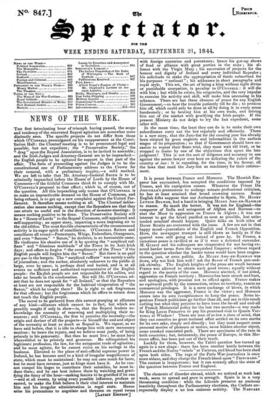It is peace between France and Morocco. The Moorish Em-
peror has succumbed, has accepted the conditions imposed by France, and his castigation ceases. Whatever the Prince Ds JOINYILLE'S pretensions to undergo minute professional criticism,
he has at least attained that broad crowning success. Some English folks suppose that our Ambassador in Spain, Mr. HENRY.
LYTTON BULWER, had a hand in bringing MULEY ABD-ER,RAHMAN to reason. So much the better. It was not for England—the conqueror of India and antagonist of Afghan and Burman—to abet the Moor in aggression on France in Algiers ; it was our interest to get the brawl pacified as soon as possible, lest unin-
tended mischief should happen. Quiet folks on both sides of Dover Straits are contented with the issue. A few are not in that happy mood journalists of the English and French Opposition. Here, the newspaper trumpet is still blown as lustily as if the quarrel were still going on instead of gone by. In France, a victorious peace is cavilled at as if it were a defeated surrender. M. GU1ZOT and his colleagues are vituperated for not having ex- acted harder terms from the vanquished Emperor ; without regard to the question whether the harder terms would have been magna- nimous, just, or even politic. As MULEY ADDER-RAHMAN was down, why not kick him well ? ask the flower of French pen-and- ink chivalry. The English knights of the press are wroth because France was allowed to obtain such good terms ; equally without regard to the merits of the case. Morocco abetted, if not aided, aggression on French territory ; Morocco has been struck and hurt, and apologizes, with promise not to offend again. France makes no equivocal profit by the transaction, seizes no territory, exacts no commercial privileges. It is a mere exchange of blows, in which Morocco was the aggressor, France is the victor ; and Morocco enters into its own recognizances to keep the peace. Some in- genious French politicians go further than all, and see in this result nothing but what they perceive to have been the be-all and end-all of French Ministerial policy for the last two months—a way made for King Louts PHILIPPE to pay his promised visit to Queen VIC- TORIA at Windsor ! There are men of so low a class of mind, that they can conceive no great national affair settled on its own merits for its own sake, simply and directly ; but they must suspect some personal motive of pleasure or malice, some hidden ulterior object, some crooked concealed path. There are specimens of the race in both countries ; but, fortunately, the peace of Europe, in this Mo- rocco affair, has been put out of their reach.
Luckily for them, however, the Tahiti question has turned up again in a new shape : there has been another battle between the French and the Native " rebels " at Taravau, and blood has been shed upon both sides. The rage of the Paris War-journalists is once more ablaze, and they charge the French blood upon " PRITCHARD." The contest is inopportune ; but it can scarcely affect the state of the question between France and England.


























